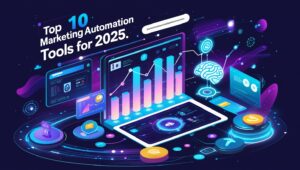Sarah Martinez stood at a crossroads in her small bakery business. Traditional methods were no longer cutting it. Sales were stagnant, customer management was overwhelming, and she felt stuck. That’s when she discovered artificial intelligence for small businesses could be her secret weapon.
Small businesses are experiencing a remarkable transformation through AI automation tools. Entrepreneurs across the United States are realizing how small businesses can use AI automation to streamline operations, reduce costs, and unlock unprecedented growth potential. The digital revolution is no longer just for tech giants—it’s accessible and powerful for every small business owner.
AI technologies are reshaping how companies operate, offering smart solutions that were once considered out of reach. From customer service to marketing strategies, artificial intelligence is creating opportunities for efficiency and innovation that can level the playing field for small enterprises.
Table of Contents
ToggleKey Takeaways
- AI automation provides cost-effective solutions for small businesses
- Technology can significantly improve operational efficiency
- Small businesses can compete with larger companies through smart AI tools
- Automation reduces manual workload and minimizes human error
- AI helps businesses make data-driven decisions quickly
Understanding AI Automation: A Game-Changer for Small Business Growth
Artificial intelligence is revolutionizing how small businesses operate, offering unprecedented opportunities for growth and efficiency. Automation software for SMBs has become a critical tool in transforming traditional business processes, enabling entrepreneurs to compete more effectively in a digital marketplace.
AI and machine learning for entrepreneurs are no longer futuristic concepts but practical solutions that drive real business value. Small businesses can now leverage sophisticated technologies that were once accessible only to large corporations.
Key Components of Business AI Automation
Successful AI-powered business process automation relies on several essential components:
- Intelligent data processing algorithms
- Machine learning models
- Advanced analytics capabilities
- Seamless integration with existing systems
The Evolution of AI in Business Operations
“Technology is best when it empowers small businesses to achieve more with less.” – Unknown Entrepreneur
The journey of AI in business has been transformative. From basic computational tasks to complex decision-making systems, AI has rapidly evolved to become an indispensable business tool.
Benefits of AI Integration for SMBs
Small businesses embracing AI automation can expect significant advantages:
- Reduced operational costs
- Enhanced productivity
- Improved customer experiences
- Data-driven strategic insights
The future of small business lies in intelligent, adaptive technologies that can transform challenges into opportunities.
How Small Businesses Can Use AI Automation

Small businesses are discovering powerful opportunities with intelligent automation solutions that transform traditional workflows. Robotic process automation for small companies enables entrepreneurs to streamline operations, reduce manual tasks, and unlock significant productivity gains.
Implementing AI technologies doesn’t require massive investments or technical expertise. Modern automation tools are designed to be user-friendly and accessible for businesses of all sizes. Small companies can start with targeted approaches that address specific operational challenges.
- AI chatbots for customer service can handle routine inquiries 24/7
- Automated scheduling systems reduce administrative overhead
- Intelligent data entry and processing tools minimize human error
- Predictive analytics help optimize business decision-making
The key to successful AI automation is strategic implementation. Business owners should:
- Identify repetitive tasks that consume significant time
- Research scalable AI solutions matching specific business needs
- Start with low-risk, high-impact automation projects
- Continuously evaluate and adjust automation strategies
Cloud-based platforms now offer affordable AI tools that can dramatically enhance small business efficiency without requiring extensive technical knowledge. From customer relationship management to financial tracking, AI-powered solutions provide competitive advantages previously available only to larger enterprises.
AI automation is not about replacing human workers, but empowering them to focus on higher-value strategic activities.
Essential AI-Powered Tools for Business Process Automation
Small businesses are rapidly embracing ai-driven data analytics to streamline operations and boost efficiency. The digital transformation landscape offers powerful AI tools that can revolutionize how companies approach daily business processes.
Automating business processes has become crucial for competitive advantage. Modern AI technologies provide sophisticated solutions across multiple business functions, enabling small businesses to work smarter and more efficiently.
Customer Service Automation Solutions
AI-powered customer service tools are transforming how businesses interact with clients. These intelligent systems offer:
- 24/7 chatbot support
- Automated ticket routing
- Personalized customer interaction tracking
Financial Management and Accounting Tools
AI for data analysis is revolutionizing financial management with smart accounting solutions that provide:
- Real-time expense tracking
- Predictive financial forecasting
- Automated invoicing and reporting
| AI Tool Category | Key Features | Business Impact |
|---|---|---|
| Customer Service AI | Chatbots, Automated Responses | Improved Response Time |
| Financial Management | Expense Tracking, Forecasting | Enhanced Financial Insights |
| Marketing Automation | CRM Integration, Lead Scoring | Increased Sales Efficiency |
Marketing and Sales Automation Platforms
Advanced AI platforms help businesses optimize marketing strategies and sales processes through intelligent analytics and automated workflows.
By leveraging these AI-powered tools, small businesses can unlock unprecedented levels of efficiency and strategic insights.
Implementing AI Chatbots for Enhanced Customer Experience

Small businesses are rapidly adopting ai virtual assistants to revolutionize customer interactions. Machine learning applications have transformed chatbot technology, enabling intelligent automation that delivers personalized and efficient customer experiences.
AI chatbots offer critical advantages for modern businesses:
- 24/7 customer support without additional staffing costs
- Instant response times reducing customer wait periods
- Consistent and accurate information delivery
- Scalable customer engagement solutions
Selecting the right AI chatbot requires careful consideration of your business needs. Compatibility with existing systems and potential for customization are crucial factors in successful implementation.
| Chatbot Feature | Business Impact |
|---|---|
| Natural Language Processing | Improved conversation understanding |
| Multi-Language Support | Expanded customer reach |
| Integration Capabilities | Seamless workflow management |
Training your AI chatbot is essential for creating meaningful customer interactions. Invest time in developing comprehensive response protocols and continuously refine the system’s machine learning capabilities to enhance performance.
Leveraging AI for Data Analysis and Decision Making
Small business ai solutions are revolutionizing how companies understand and predict business performance. Artificial intelligence for small companies has become a powerful tool for transforming raw data into actionable insights. AI automation for smes enables business owners to make smarter, more informed decisions with unprecedented accuracy.
Modern small businesses face complex data challenges that traditional analysis methods cannot effectively solve. AI-powered analytics platforms provide comprehensive solutions that go beyond simple reporting.
Predictive Analytics for Business Growth
Predictive analytics harness machine learning algorithms to forecast future trends and potential outcomes. Small businesses can now:
- Anticipate customer demand
- Identify potential market opportunities
- Minimize financial risks
- Optimize resource allocation
Customer Behavior Analysis and Insights
AI tools transform customer data into meaningful insights. By analyzing purchasing patterns, interaction histories, and preferences, businesses gain a deeper understanding of their target audience.
Key benefits include:
- Personalized marketing strategies
- Improved customer retention
- More accurate sales forecasting
Market Trend Forecasting
Advanced AI algorithms can process massive amounts of market data, helping small businesses predict industry shifts and emerging trends. This capability allows companies to stay agile and competitive in rapidly changing markets.
“AI is not just a technology, it’s a strategic advantage for small businesses looking to outperform their competitors.” – Tech Innovation Report
Streamlining Operations with Robotic Process Automation

Robotic Process Automation (RPA) represents a breakthrough in ai technologies for entrepreneurs seeking to transform their operational efficiency. Small businesses can now leverage automated workflows with ai to dramatically reduce manual work and minimize human error.
AI-powered process automation enables companies to streamline repetitive tasks across multiple business functions. By implementing RPA, organizations can:
- Automate data entry processes
- Optimize inventory management
- Accelerate order processing
- Reduce operational costs
- Improve overall productivity
“RPA is not about replacing human workers, but empowering them to focus on strategic, high-value activities.” – Tech Innovation Experts
The key advantage of RPA lies in its ability to perform tasks with remarkable speed and precision. Small businesses can now compete with larger enterprises by implementing intelligent automation strategies. Sophisticated AI algorithms enable these systems to learn and adapt, continuously improving workflow efficiency.
Practical implementation of RPA requires careful planning and strategic approach. Business leaders should start by identifying repetitive, rule-based tasks that can be automated, ensuring minimal disruption to existing processes.
AI-Driven Marketing Strategies for Small Businesses
Small businesses are rapidly embracing intelligent automation for startups to revolutionize their marketing approaches. AI software for small firms has become a game-changing tool for creating more effective, efficient marketing strategies that compete with larger enterprises.
AI-driven business automation is transforming how small businesses approach marketing, offering unprecedented opportunities for growth and customer engagement. The digital landscape now provides sophisticated tools that level the playing field for smaller organizations.
Content Generation and Optimization
Modern AI tools can help small businesses create compelling marketing content with remarkable efficiency. These intelligent systems analyze audience preferences and generate targeted content that resonates with specific customer segments.
- Automated content creation using natural language processing
- Real-time content optimization based on audience engagement
- Personalized content recommendations
Personalized Customer Targeting
AI enables precise customer segmentation by analyzing complex data patterns. Small businesses can now develop hyper-targeted marketing campaigns that speak directly to individual customer needs and preferences.
- Advanced demographic and behavioral analysis
- Predictive customer journey mapping
- Dynamic audience segmentation
Social Media Management Automation
Intelligent automation tools streamline social media marketing by scheduling posts, analyzing engagement metrics, and generating insights that help businesses optimize their digital presence.
- Automated posting across multiple platforms
- Sentiment analysis of customer interactions
- Performance tracking and reporting
By leveraging these AI-powered marketing strategies, small businesses can compete more effectively in a rapidly evolving digital marketplace.
Cost-Effective AI Solutions for Small Business Budget

Small businesses often struggle with the perception that ai automation tools for smbs are expensive and out of reach. The good news is that affordable ai-powered business automation solutions are now more accessible than ever before.
Entrepreneurs can leverage several cost-effective strategies for automating small business processes with ai without breaking the bank. Cloud-based AI platforms offer scalable options that allow businesses to start small and grow their automation capabilities incrementally.
- Open-source AI tools with free tiers
- Subscription-based automation platforms
- Pay-as-you-go AI services
- Microservice AI solutions
Budget-conscious businesses can explore AI automation tools that provide maximum value with minimal investment. Many providers now offer starter packages designed specifically for small and medium-sized enterprises, enabling companies to experiment with AI technologies without significant financial risk.
Key considerations for selecting affordable AI solutions include:
- Flexible pricing models
- Scalability of the platform
- Integration capabilities
- Ease of implementation
By carefully evaluating available options and starting with targeted automation projects, small businesses can unlock powerful AI capabilities while maintaining financial prudence.
Measuring ROI and Success Metrics in AI Implementation
Tracking the performance of AI automation strategies is crucial for small businesses seeking to maximize their technological investments. Understanding how to measure return on investment (ROI) helps enterprises validate their ai automation benefits and refine their approach to leveraging ai for small business efficiency.
Key Performance Indicators for AI Implementation
Small enterprises can evaluate their ai automation strategies through specific metrics that demonstrate tangible business improvements:
- Cost reduction percentage
- Productivity increase
- Customer satisfaction rates
- Time saved on repetitive tasks
- Error reduction in processes
Impact Assessment Methods
Effective evaluation of AI automation requires comprehensive analysis techniques that go beyond surface-level metrics. Businesses should consider both quantitative and qualitative measurements to understand the full scope of technological transformation.
| Assessment Method | Key Focus | Measurement Approach |
|---|---|---|
| Comparative Analysis | Pre and Post AI Implementation | Benchmark performance metrics |
| Workflow Efficiency Tracking | Process Optimization | Time and resource utilization |
| Employee Productivity Evaluation | Human-AI Collaboration | Output quality and speed |
Long-term Value Analysis
Beyond immediate gains, small businesses must consider the sustained impact of AI automation. Strategic implementation creates compounding benefits that extend far beyond initial investment, transforming operational capabilities and competitive positioning.
By systematically measuring and analyzing AI automation outcomes, small enterprises can continuously refine their technological strategies, ensuring ongoing efficiency and growth.
Conclusion
Small business AI automation represents a critical turning point for entrepreneurs seeking competitive advantages in today’s digital landscape. The journey through various AI-powered solutions demonstrates how technology can transform operational efficiency, customer engagement, and strategic decision-making for small firms across industries.
AI automation adoption by small firms is no longer a futuristic concept but a practical necessity. From intelligent chatbots to predictive analytics, businesses can now leverage cutting-edge technologies that were once accessible only to large corporations. Small business AI automation use cases have expanded dramatically, enabling companies to streamline processes, reduce costs, and unlock unprecedented growth potential.
The digital transformation powered by AI is not about replacing human workers but empowering them with intelligent tools. Small businesses that embrace these technologies will position themselves at the forefront of innovation, creating more agile, responsive, and competitive organizations. The key is to start small, identify specific needs, and gradually integrate AI solutions that align with unique business objectives.
As technology continues to evolve, the opportunities for small businesses to harness AI automation will only become more sophisticated and accessible. Entrepreneurs who take proactive steps to understand and implement these technologies will be best prepared to thrive in an increasingly digital business ecosystem.
FAQ
What is AI automation and how can it benefit small businesses?
AI automation is the use of artificial intelligence technologies to automate and streamline business processes. For small businesses, it can provide significant benefits such as increased efficiency, reduced operational costs, improved customer service, and data-driven decision-making. By implementing AI tools, small businesses can automate repetitive tasks, gain valuable insights, and free up resources to focus on strategic growth.
Are AI automation tools affordable for small businesses with limited budgets?
Yes, there are many cost-effective AI automation solutions designed specifically for small businesses. Cloud-based platforms, subscription-based services, and open-source tools have made AI technologies more accessible. Many providers offer scalable solutions that allow businesses to start small and expand as their needs grow, making AI automation a viable option for companies with tight budgets.
What are some practical AI automation tools small businesses can start using?
Small businesses can leverage various AI automation tools, including AI-powered chatbots for customer service, marketing automation platforms, predictive analytics software, robotic process automation (RPA) for repetitive tasks, AI-driven accounting tools, and social media management systems. Popular options include Zapier for workflow automation, Drift for conversational marketing, and QuickBooks AI for financial management.
How can AI help with customer service for small businesses?
AI chatbots and virtual assistants can provide 24/7 customer support, instantly respond to common inquiries, route complex issues to human representatives, and offer personalized interactions. These tools can handle multiple customer conversations simultaneously, reduce response times, and provide consistent customer service without the need for additional staff.
Is AI automation complicated to implement for non-technical business owners?
Many modern AI automation tools are designed with user-friendly interfaces and require minimal technical expertise. Many platforms offer easy integration, drag-and-drop functionality, and comprehensive support. Businesses can start with simple automation solutions and gradually expand their AI capabilities as they become more comfortable with the technology.
What types of business processes can be automated using AI?
AI can automate numerous business processes, including customer service, email marketing, social media management, data entry, financial reporting, inventory management, lead generation, customer segmentation, predictive analytics, scheduling, and basic accounting tasks. The key is identifying repetitive, time-consuming tasks that can be streamlined through intelligent automation.
How can small businesses measure the ROI of AI automation?
Businesses can measure AI automation ROI by tracking key performance indicators such as time saved, reduction in operational costs, increased productivity, improved customer satisfaction rates, and revenue growth. Many AI tools provide built-in analytics and reporting features that help quantify the impact of automation on business performance.
Are there any risks associated with implementing AI automation?
While AI automation offers numerous benefits, potential risks include initial implementation challenges, data privacy concerns, and the need for ongoing training and maintenance. Small businesses should carefully select reputable AI solutions, ensure robust data protection measures, and maintain a balance between automated and human-driven processes to mitigate potential drawbacks.
Can AI automation help with marketing for small businesses?
Absolutely. AI-powered marketing tools can help with content generation, social media management, customer segmentation, personalized targeting, predictive analytics for lead scoring, and automated email marketing campaigns. These technologies enable small businesses to create more targeted, efficient marketing strategies with limited resources.
How quickly can a small business see results from AI automation?
The timeline for seeing results varies depending on the specific AI tools and processes implemented. Some businesses may experience immediate benefits like time savings and improved efficiency, while others might see more significant impacts over several months. Starting with small, manageable automation projects and gradually expanding can help businesses realize incremental improvements and long-term value.











